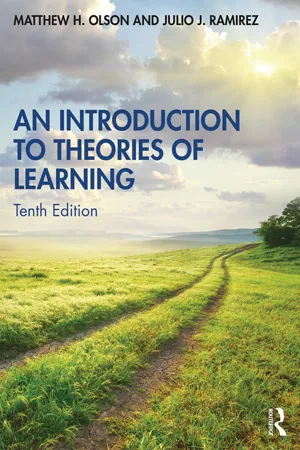
- 546 pages
- English
- ePUB (mobile friendly)
- Available on iOS & Android
An Introduction to Theories of Learning
About this book
Since its first edition, An Introduction to Theories of Learning has provided a uniquely sweeping review of the major learning theories from the 20th century that profoundly influenced the field of psychology. In this tenth edition, the authors present further experimental evidence that tests many of the fundamental ideas presented in these classic theories, as well as explore many of the advances in psychological science and neuroscience that have yielded greater insight into the processes that underlie learning in human beings and animals.
The four main goals of this text are to define learning and to show how the learning process is studied (Chapters 1 and 2), to place learning theory in historical perspective (Chapter 3), and to present essential features of the major theories of learning with implications for educational practices (Chapters 4 through 16). The authors retained the best features of earlier editions while making revisions that reflect current research and scholarship, including coverage of active learning and the testing effect, information for problem solving in ravens, data illustrating the neurobiological basis of the cognitive map and spatial learning, new research on brain plasticity and its role in learning as well as the impact of poverty on brain and cognitive development, and new evidence that challenges the notion of learning styles.
Complete with chapter summaries, discussion questions, and a glossary, this text is essential reading for theories of learning and applied cognitive psychology courses.
See "Support Material" below for new online resources. Instructor resources include PowerPoint slides and a testbank containing over 500 questions (in both Microsoft Word and GIFT file formats). Student resources include chapter summaries, discussion questions, and a glossary of key terms.
Frequently asked questions
- Essential is ideal for learners and professionals who enjoy exploring a wide range of subjects. Access the Essential Library with 800,000+ trusted titles and best-sellers across business, personal growth, and the humanities. Includes unlimited reading time and Standard Read Aloud voice.
- Complete: Perfect for advanced learners and researchers needing full, unrestricted access. Unlock 1.4M+ books across hundreds of subjects, including academic and specialized titles. The Complete Plan also includes advanced features like Premium Read Aloud and Research Assistant.
Please note we cannot support devices running on iOS 13 and Android 7 or earlier. Learn more about using the app.
Information
Table of contents
- Cover
- Endorsements
- Half Title
- Title
- Copyright
- Dedication
- Contents
- Preface
- Acknowledgments
- About the Authors
- Part I Introduction to Learning
- Part II Predominantly Functionalistic Theories
- Part III Predominantly Associationistic Theories
- Part IV Predominantly Cognitive Theories
- Part V A Predominantly Neurophysiological Theory
- Part VI An Evolutionary Theory
- Part VII Reflections
- Glossary
- References
- Author Index
- Subject Index